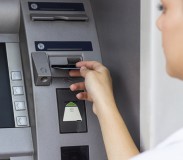
The Future of Bitcoin

Bitcoin has created a lot of buzz since it was introduced as a form of digital currency 2009. It’s even been heralded as the future of banking. So what is bitcoin? Invented by Satoshi Nakamoto, bitcoin is a type of online payment process that does not involve a third party, outside of the two parties involved in the transaction. Transactions are checked by network nodes. Once verified, they are recorded in a public ledger. Bitcoins are created when users of the system help to process and verify payments, recording them in the ledger. This is called bitcoin mining. Because bitcoins take time to create, the supply is fixed. Bitcoins can also be obtained by trading services, currency, or products.
History
Bitcoin has gained popularity as a form of currency since it was introduced, largely due to consumer mistrust of international financial institutions. Merchants may be motivated to accept bitcoin because fees are lower than processing fees for credit cards. However, as the system continues to evolve, lawmakers have acknowledged that bitcoin may indeed be valuable to customers.
Predictions
Both critics and supporters of bitcoin seem to agree on one thing: this currency has a future on the financial scene. If anything, the premise is a clever one that can help financial changemakers to improve upon the current system. If anything, the system has already given rise to hundreds of other types of digital or cryptocurrency. Although bitcoin currently dominates the market, niche currencies such as Craftcoin, Namecoin, and even Potcoin are used to purchase highly specific products. Although bitcoin is often referred to as a type of currency, it’s the open-source software that truly has potential. The exchange between bitcoin users is a way to mimic currency generation. Both buyers and sellers can benefit from this.
Pros
 Bitcoin has a lot of advantages that address problems or failures of most government-regulated currency systems. Given that the supply is fixed, there is a lower risk of inflation. There is a finite number of bitcoins that can be released, making them more valuable. The system also has a lower risk of collapsing, as it is not affiliated with a government as most currencies are. Bitcoin also operates on a much simpler terms than payment systems. Neither buyers nor sellers have the option to reverse a transaction. This saves money as there is no chance of anyone going back on the exchange. Without a third party, this process is cheaper. Bitcoin users pay fewer fees. Finally, one major advantage of bitcoin is that transactions are not traceable. It’s not possible to trace a bitcoin back to a particular buyer or seller, as transactions written in the ledger are encrypted.
Bitcoin has a lot of advantages that address problems or failures of most government-regulated currency systems. Given that the supply is fixed, there is a lower risk of inflation. There is a finite number of bitcoins that can be released, making them more valuable. The system also has a lower risk of collapsing, as it is not affiliated with a government as most currencies are. Bitcoin also operates on a much simpler terms than payment systems. Neither buyers nor sellers have the option to reverse a transaction. This saves money as there is no chance of anyone going back on the exchange. Without a third party, this process is cheaper. Bitcoin users pay fewer fees. Finally, one major advantage of bitcoin is that transactions are not traceable. It’s not possible to trace a bitcoin back to a particular buyer or seller, as transactions written in the ledger are encrypted.
Cons
Of course, being untraceable also has its disadvantages. In the past, bitcoin use among criminals has attracted attention among legislators, law enforcers, media outlets, and financial institutions. Theft, fraud, money laundering, tax evasion, and financing illegal activities such as drug smuggling are all potential problems with a form of decentralized currency.







